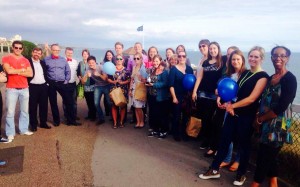Two day Masterclass, Thursday 11th and Friday 12th June, Executive Business Centre, Lansdowne Campus
Art has been said to be a way to express ourselves, to make sense of our experiences and to connect with ourselves, others, our world and life. The arts are beginning to gain greater recognition as a deep form of learning.
This Masterclass will provide health and social care educationalists and practitioners with the opportunity to immerse themselves in hands-on arts experience and come away with individualized working methods to adapt in their own practice and learning contexts. No previous experience of the arts is necessary.
Dr Catherine Lamont-Robinson is an artist/researcher, with a BA and MA in Fine Art and a Doctorate in Education. Catherine is passionate about creative engagement and bringing different ways of knowing into practice – drawing on the role of tacit knowledge, discourses around embodiment and whole-body intelligence. She has worked for over ten years in clinical, educational and community contexts and is a Senior Associate Lecturer at Bristol University facilitating Creative Arts and Humanities within Social and Community Medicine.
Schedule:
Each day will start at 9.30am and run until 4.15pm with regular refreshment breaks and lunch provided. The two days will include some presentations, discussions and practical sessions.
Booking Information:
- BU staff £120
- BU students £90
This price includes two full days with the course facilitator, all refreshments and all class materials. Accommodation and travel costs are not included.
Book your place online by 1 June 2015 at https://using-art-in-health-and-social-care.eventbrite.co.uk
For more information contact: (01202) 962184 / rfreeman@bournemouth.ac.uk























 REF Code of Practice consultation is open!
REF Code of Practice consultation is open! BU Leads AI-Driven Work Package in EU Horizon SUSHEAS Project
BU Leads AI-Driven Work Package in EU Horizon SUSHEAS Project Evidence Synthesis Centre open at Kathmandu University
Evidence Synthesis Centre open at Kathmandu University Expand Your Impact: Collaboration and Networking Workshops for Researchers
Expand Your Impact: Collaboration and Networking Workshops for Researchers ECR Funding Open Call: Research Culture & Community Grant – Apply now
ECR Funding Open Call: Research Culture & Community Grant – Apply now ECR Funding Open Call: Research Culture & Community Grant – Application Deadline Friday 12 December
ECR Funding Open Call: Research Culture & Community Grant – Application Deadline Friday 12 December MSCA Postdoctoral Fellowships 2025 Call
MSCA Postdoctoral Fellowships 2025 Call ERC Advanced Grant 2025 Webinar
ERC Advanced Grant 2025 Webinar Update on UKRO services
Update on UKRO services European research project exploring use of ‘virtual twins’ to better manage metabolic associated fatty liver disease
European research project exploring use of ‘virtual twins’ to better manage metabolic associated fatty liver disease